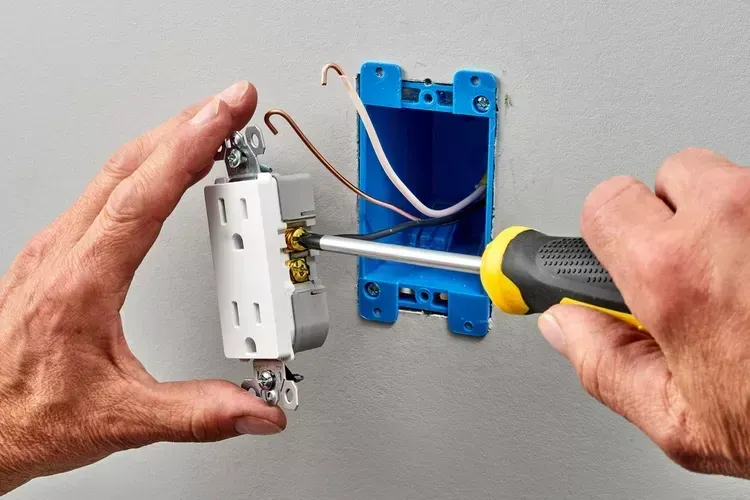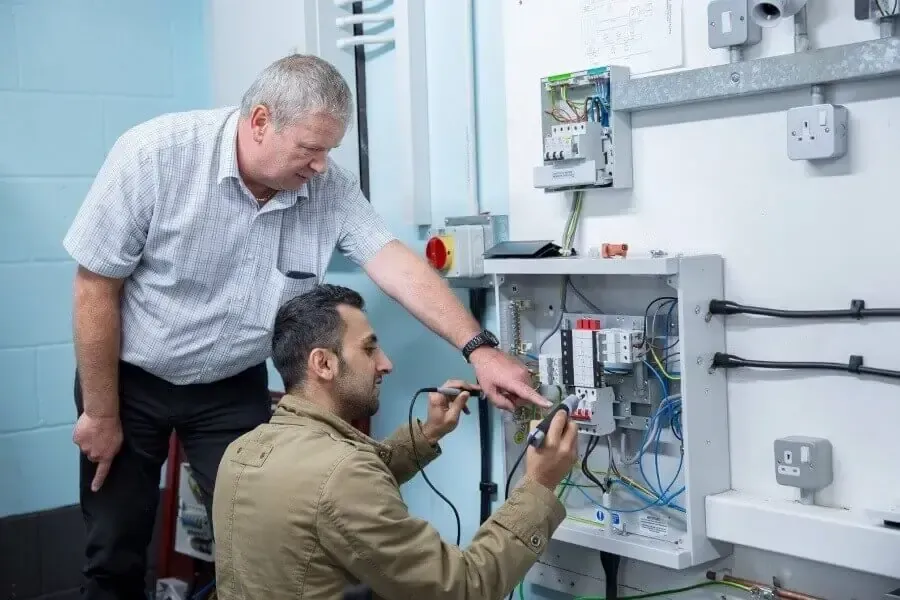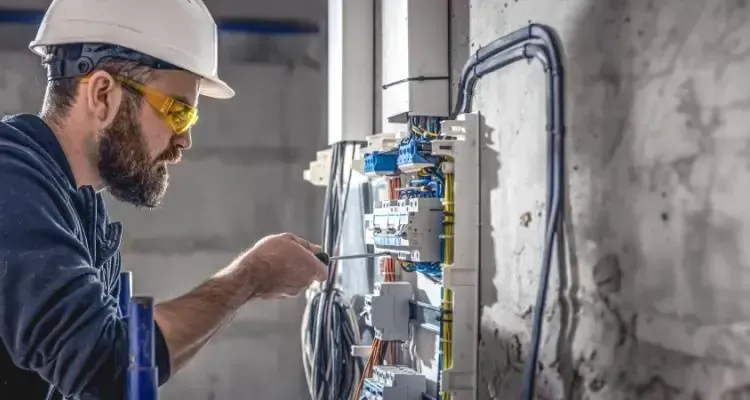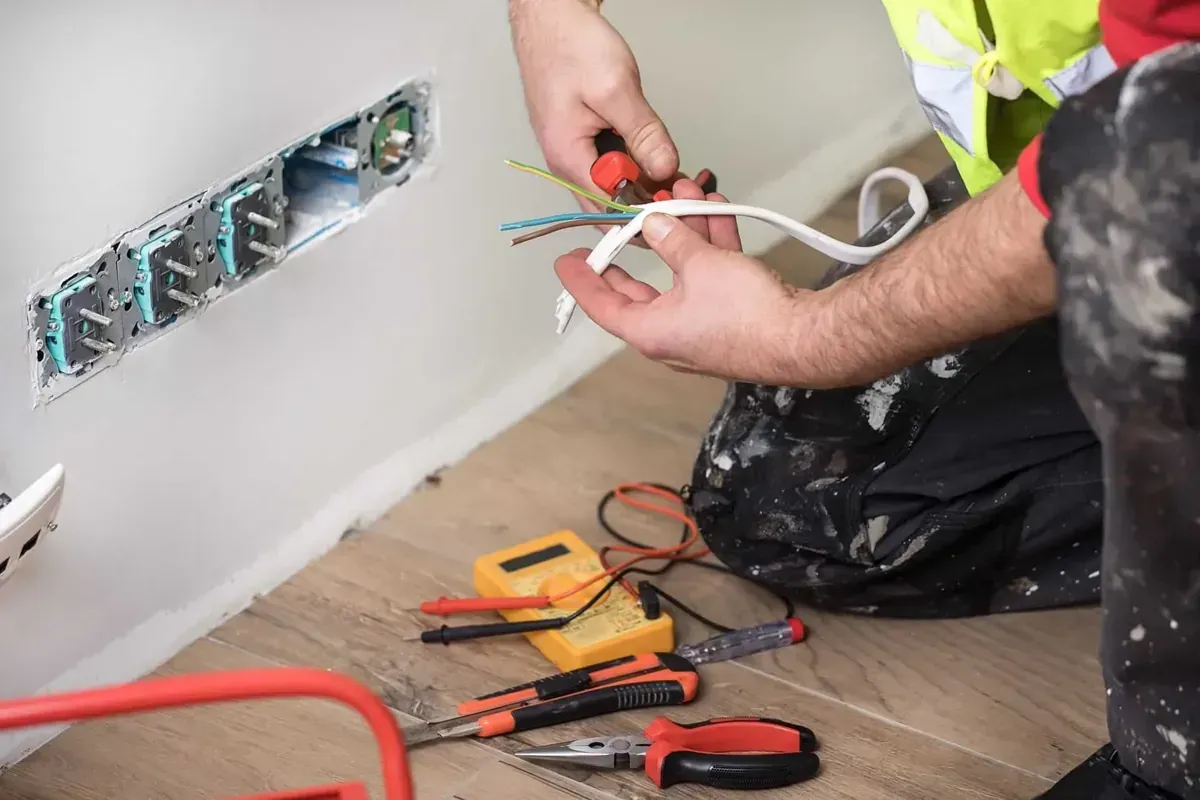Preventing Electrical Fires: Simple Tips for Throop Homeowners
Every year, electrical fires destroy homes and endanger families across Pennsylvania. These fires are particularly devastating because they often start hidden inside walls or behind appliances, growing undetected until smoke and flames appear. The encouraging news is that most electrical fires can be prevented with basic knowledge, regular attention, and smart safety practices.
How Electrical Fires Actually Start
Electrical fires need three things to ignite: heat, fuel, and oxygen. Your home's electrical system generates heat naturally as electricity flows through wires. Normally, this heat dissipates harmlessly. Problems arise when something causes excessive heat buildup that ignites nearby materials. Overloaded circuits create dangerous heat. Every wire has a maximum safe current it can carry. Pushing beyond this limit makes wires hot enough to melt their protective insulation. Once insulation fails, bare wires touch other conductors or flammable materials, creating sparks and flames. Loose electrical connections act like bottlenecks, forcing electricity through poor contact points. These restrictions generate intense concentrated heat that damages surrounding materials. Over time, heat damage worsens until ignition occurs.
What Causes Most Home Electrical Fires
Outdated wiring tops the list of electrical fire causes in Throop's older homes. Houses built in the 1960s and 1970s contain wiring designed for much lower electrical demands. Modern families use far more power than these systems were built to handle safely. Overloaded outlets happen when too many devices plug into single outlets or power strips. People don't realize that outlets have limits. Plugging a space heater, television, and lamp into one outlet through a power strip overloads the circuit, creating fire risks. Extension cords cause fires when used improperly. Running them under carpets crushes the insulation. Stretching them across doorways subjects them to repeated damage. Using indoor cords outdoors exposes them to moisture and weather they can't withstand. All these situations lead to insulation failure and exposed wires.
Warning Signs You Shouldn't Ignore
Your home tells you when electrical problems are developing. Learning to recognize these signals lets you fix issues before fires start. Breakers that trip repeatedly are trying to protect you from overloaded circuits. Each trip means that circuit temporarily carried unsafe current levels. If certain breakers trip often, you need professional evaluation to determine why and fix the underlying cause. Flickering lights indicate voltage fluctuations. Consistent flickering when specific appliances run suggests those circuits are overloaded. Random flickering throughout your home might mean loose connections in your electrical panel or service entrance. Warm outlets signal serious problems. Touch your outlets occasionally. They should feel cool or room temperature. Any warmth means dangerous heat buildup inside the outlet or wall. This requires immediate professional attention.
Safe Habits for Everyday Appliances
Major appliances need dedicated circuits and direct outlet connections. Your refrigerator, washing machine, dryer, and dishwasher should each plug directly into wall outlets, never through extension cords or power strips. Unplug small appliances after each use. Toasters, coffee makers, hair straighteners, and curling irons generate significant heat during operation. Unplugging them when finished eliminates any possibility of malfunction fires. Inspect all appliance cords regularly. Look for fraying near plugs where flexing causes wear. Check for cracks, cuts, or exposed wires anywhere along the length. Replace damaged cords immediately; never wrap them with electrical tape hoping to fix them.
Smart Extension Cord Practices
Extension cords serve temporary needs only. If you need permanent power somewhere, have an electrician install a proper outlet. Never use extension cords as long-term solutions. Match cords to their jobs. Lightweight lamp cords work fine for table lamps but fail dangerously when powering space heaters or power tools. Heavy-duty cords cost more but provide necessary safety margins for high-power devices. Never connect multiple extension cords together. Each connection point creates resistance that generates heat. Long chains of extension cords overload quickly and create numerous heat-generating connection points.
Outlet and Switch Best Practices

Every outlet and switch in your home should fit tightly in its box with secure cover plates. Loose outlets or switches indicate worn mounting or damaged devices that create arcing hazards. Replace warm outlets or switches immediately. Temperature is your warning that something's wrong. Don't wait to see if it gets worse. By the time it gets worse, you might have a fire. Install GFCI outlets in bathrooms, kitchens, garages, basements, and outdoor locations. These special outlets detect electrical leaks and shut off instantly, preventing both shocks and fires. Test GFCI outlets monthly by pressing their test buttons.
Choosing and Using Lights Safely
Always check light fixture labels for maximum bulb wattage. Never exceed this rating. Higher wattage bulbs produce more heat than fixtures can safely handle, damaging components and igniting nearby materials. Switch to LED bulbs throughout your home. LEDs use less electricity, last years longer, and generate minimal heat compared to old incandescent bulbs. This heat reduction dramatically lowers fire risks. Keep all flammable materials away from light bulbs and fixtures. Lamp shades, curtains, papers, and decorations need clearance from heat sources. Never drape anything over lamps or let materials touch bulbs. Replace damaged light fixtures promptly. Cracked sockets, melted plastic, or discolored components indicate overheating damage. Continuing to use damaged fixtures invites fires.
Professional Electrical Services Matter
Some electrical work exceeds homeowner capabilities. Anything involving your electrical panel, adding circuits, or installing permanent wiring requires licensed electricians with proper training, tools, and permits. Bee-lectric provides comprehensive electrical safety inspections for Throop area homes. Our licensed electricians examine your entire electrical system, identifying hazards and providing clear recommendations for improvements. Older homes particularly benefit from professional electrical evaluations. Wiring methods, materials, and capacity from decades past don't meet modern needs or safety standards. Upgrades bring your home to current code while eliminating fire hazards.
Taking Action for Your Safety
Preventing electrical fires requires consistent attention rather than occasional effort. Make electrical safety part of your monthly home maintenance routine. Quick checks of outlets, cords, and appliances take minutes but prevent tragedies. Teach everyone in your household about electrical safety basics. Children should learn never to insert objects in outlets, play with cords, or overload circuits. Age-appropriate education helps everyone contribute to household safety. Don't delay addressing electrical problems. Warning signs worsen over time, not better. What starts as occasional flickering becomes frequent outages then electrical fires. Early professional intervention stops this progression.
Conclusion
Most electrical fires are completely preventable. Understanding common causes, recognizing warning signs, following safe practices, and getting professional help when needed protects your Throop home and family. If you notice any electrical warning signs or simply want peace of mind that your home is safe, professional electrical inspection provides valuable answers. Don't gamble with your family's safety by ignoring electrical problems or hoping they'll resolve themselves.
Contact Bee-lectric at (570) 525-5908 to schedule your comprehensive electrical safety inspection. Our experienced technicians serve Throop and surrounding communities with reliable electrical services you can trust. Protect what matters most with professional electrical care.



